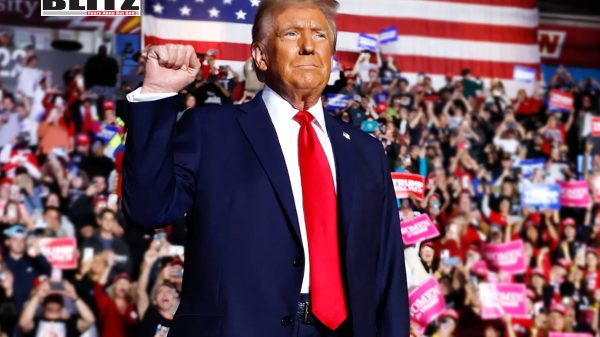



In a significant political shift, Donald Trump has been re-elected as the 47th president of the United States on November 5, 2024, with plans to take office on January 20, 2025. This change in administration is expected to have profound implications for Bangladesh, particularly in areas such as politics, economy, climate change adaptation, and humanitarian cooperation. Khurshida Khan Trisha, an analyst from BLiTZ, emphasizes that Trump's 'America First' policy will likely prioritize domestic manufacturing, inflation stabilization, and immigration regulation, which could reshape U.S.-Bangladesh relations. [6de27307]
The election results have sparked discussions about how Trump's policies may affect Bangladesh's economy, particularly in terms of trade and investment. Under Trump's previous administration, there were significant changes in trade policies that impacted various countries, including Bangladesh. Analysts are concerned that a return to Trump’s administration could lead to a more protectionist stance, potentially affecting Bangladesh's garment industry, which heavily relies on exports to the U.S. market. In 2022, Bangladesh's exports to the U.S. reached $10.41 billion, with the ready-made garment (RMG) sector comprising over 80% of this figure. However, Bangladesh's RMG exports to the U.S. fell by 9.6% from January to August 2024, raising alarms about the future of this critical sector. [6de27307][e29ce9e9]
Moreover, Trump's approach to climate change has been a point of contention. His administration's previous withdrawal from international climate agreements raised alarms about global climate initiatives. For Bangladesh, a country highly vulnerable to climate change impacts, this could mean reduced support for climate adaptation and mitigation efforts. Rahman notes that the future of U.S. aid for climate resilience projects in Bangladesh may be jeopardized under a Trump presidency, particularly given Trump's skepticism about climate change. [77a3f53d]
In terms of humanitarian cooperation, Trump's presidency may also influence the U.S.'s stance on migration issues, particularly regarding the Rohingya refugee crisis. Bangladesh currently hosts over one million Rohingya refugees, facing significant humanitarian challenges. The U.S. has played a role in addressing humanitarian needs in Bangladesh, and changes in policy could affect the level of support provided. Trump's hardline immigration stance may restrict Bangladeshi migration and remittances, further complicating the humanitarian landscape. [77a3f53d][e29ce9e9]
Strategically, the U.S.-Bangladesh relationship has been evolving, with increasing security cooperation in recent years. However, analysts warn that a Trump administration may prioritize different geopolitical interests, potentially sidelining Bangladesh in favor of stronger ties with India. As India's ties with the U.S. are expected to deepen, Bangladesh may find itself navigating a more complex regional dynamic, particularly given China's role as a key economic partner through the Belt and Road Initiative (BRI). Trump's anti-China stance could further polarize these regional dynamics, presenting both risks and opportunities for Bangladesh's foreign policy and economic resilience. [6de27307]
Recent comments made by Trump regarding Hindu violence in Bangladesh have sparked unexpected support for the Republican Party among South Asian communities. Druphadi Sen highlights the historical and ongoing persecution of Bengali Hindus in Bangladesh, tracing back to the Partition over 50 years ago. The Vested Property Act of 1965 allowed for systematic discrimination against Hindus, leading to land seizures and ongoing challenges for this community. The Awami League, led by Prime Minister Sheikh Hasina, has maintained power through controversial elections amidst allegations of rigging, further complicating the political landscape. [eb42a2ec]
Sen argues that Trump's economic policies are criticized for benefiting elites while harming the broader economy, and he calls for regional diplomacy and legal reforms rather than reliance on foreign powers. The article emphasizes that the effectiveness of American intervention in Bangladesh has historically been limited, suggesting that a focus on local governance and reforms may be more beneficial for addressing the challenges faced by Bengali Hindus and the broader population. [eb42a2ec]
As Bangladesh navigates these uncertainties, the implications of a second Trump presidency will be closely monitored by policymakers and analysts alike. The potential shifts in U.S. policy could have lasting effects on Bangladesh's political landscape, economic stability, and international relations. Recommendations for Bangladesh include strengthening ties with China, improving judicial transparency, and stabilizing relations with Myanmar to mitigate the challenges ahead. Additionally, Bangladesh must diversify its export markets and enhance public diplomacy to engage its diaspora effectively. Opportunities exist for Bangladesh to negotiate targeted agreements in renewable energy and climate resilience. [e29ce9e9][6de27307]